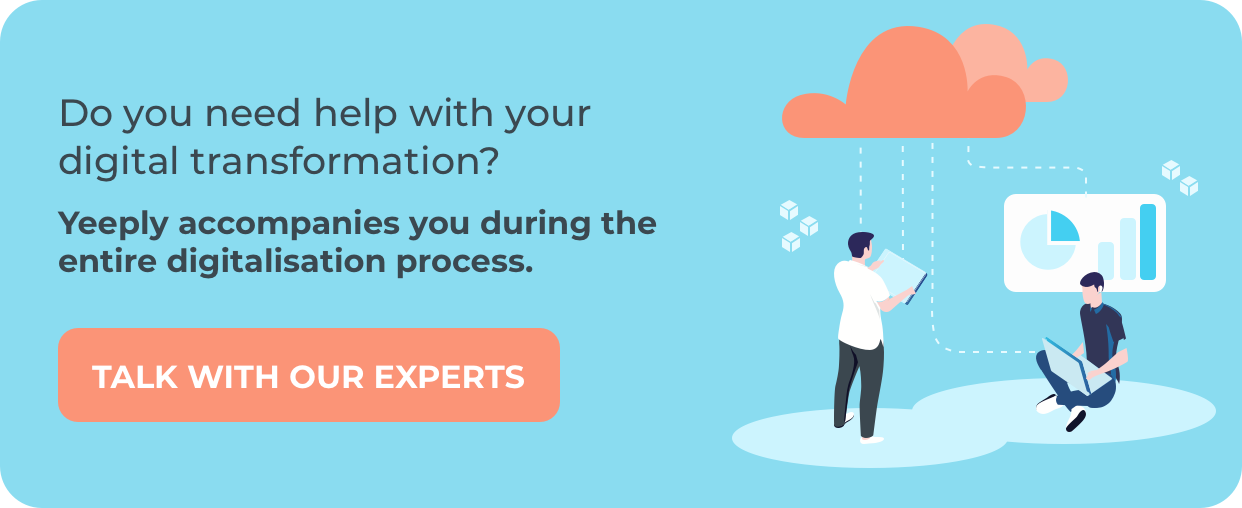Process digitisation is capable of achieving more efficient, productive and profitable processes for companies.
The digitisation of processes can reduce response times by up to 90% and we must not forget that 80% of interactions between customers and companies take place through the online channel, so proper digitisation will also improve their degree of satisfaction and user experience.
Index:
- Process digitisation
- What is process digitisation?
- Process digitisation: how can you achieve it?
- Yeeply helps you digitise your processes
Process digitisation
Why is digital transformation so important? Digital transformation incorporates technology into companies to improve areas such as efficiency, user experience or boost sales.
By addressing different areas, digitisation in business can range from creating your own app to offering mobile payment options. Its aim is to keep the company up to date, providing customers with different ways to interact with our brand, reduce costs and optimise daily operations.
In this context, it is very important to digitise processes and procedures. From the very beginning they must be well defined, so that everyone in the company can execute them in an optimal way, allowing the results of digitisation to be much more efficient.
In the following paragraphs, we will take a closer look at process digitisation in order to understand what it is and to learn about the advantages of digitising production and industrial processes.
Related article: Implementing the Customer Data Platform (CDP) in your digital transformation
What is process digitisation?
The digitalisation of a company is about applying the same principles that we use in real life in an optimal, digital way in the organisation.
Organisational structures can be redesigned and synergies between channels can be ensured. This is possible by upgrading legacy systems and adding new processes and structures that enable collaboration and integration of different functions.
In addition, for a successful omni-channel experience we also need to digitise processes to integrate different online and physical channels, such as subsidiaries, branches, customer service or advisors, for a seamless and efficient flow of information.
Digitalisation is becoming increasingly important for business innovation and operating models are already being designed for consumers, employees and business partners.
Advantages
Some of the main advantages of digitising processes:
- Ability to reach new markets
Whether we are talking about SMEs or large companies, the use of technology is key. For example, you can track interactions with potential customers and have the ability to monitor these interactions in real time to adjust your messages or the product itself, improving your return on investment.
- Increased productivity
It allows you to automate internal processes that are repetitive, making them more productive by reducing manual effort and making them less prone to human error. Therefore there is a greater number of workers freed from repetitive tasks to perform higher level work that require more creativity and other skills which cannot be replicated by a machine.
Solutions such as RPA (Robotic Process Automation) can be used for this.
- Improving the employee experience
Through e.g. a better digital document management or corporate platforms (VPN) that allow employees to securely access the company from anywhere. On this platform they can also receive internal training to acquire new skills on the job, training, corporate benefits, etc. which is highly valued among employees.
- Continuous improvement of the company
All the advantages of the digitalisation of processes lead to the improvement of the organisation by reducing costs and increasing the capacity to offer new products and services.
But these systems must be revised and adjusted to a changing market, which is possible thanks to digitisation. Digitisation allows to apply improvements quickly and effectively so that the company is always up to date and does not lose competitive power.
Areas of process digitisation
These are some business areas where digitisation of processes is very important and some examples where they can be applied:
- Retail: Payment and card management, omni-channel experience and online order management.
- Manufacturing: Smart inventory management, employee education and training, and smart file automation.
- Energy & Utilities: Regulatory compliance, smart data interface and smart energy consumption controls.
- Telecom & Media: Improving the efficiency of B2B applications, creating services with valuable mobile content or IoT-based entertainment services.
Digitisation of processes: how can you achieve it?
Today’s customers are looking for immediacy and efficiency. They want to see their electricity consumption in real time, buy a phone, be able to activate and use it quickly and have their loans handled in minutes.
To meet expectations, the first step is to understand customers’ needs and, based on those needs, create the digital gear to meet them. There is no point in digitising a process if there is no clear objective.
Once we know what objective we have to achieve, we will build the way backwards to create an effective system, reinventing the whole process and at the same time optimising each of the steps.
Digitalisation makes it possible to reconfigure processes, for example, combining automated decision-making with self-service and thus eliminating manual processes.

Here are some tips for digitising processes in your organisation:
1. Address the end-to-end customer experience.
To achieve this you need the support of all functions involved. We can create cross-functional units that bring together all the professionals involved in the process, so that together, we can improve lines of communication and ensure teamwork, improving results.
2. Betting on good professionals
We recommend having a team of excellence with trained personnel that can be called upon to digitise processes. That is why it is very important for organisations to rely on the talent of external companies that allow them to address new needs when they need them.
It is also important that the chosen team is able to build the required technology components in a modular way, so that they can be reused in other processes, maximising economies of scale.
3. Build adaptive capacity
Improve the response of companies to market demands. Increases agility when applying technology to production processes. Digitalisation makes the response to customers faster and, once installed, the updating of processes is quicker and easier.
4. More effective system incorporation
When incorporating a new organisational unit, it is often easier to implement the digital process and then attract employees to this unit. This ensures a much smoother transition, as no energy is spent on changing old habits and behaviours.
By the time the entire process volume has migrated to the new digital process, the organisational unit will have “swallowed” all the necessary employees from the legacy units.
You may be interested in: Why cybersecurity is a crucial investment for your SME
Yeeply helps you digitise your processes
Once you have defined your process digitisation strategy, you will face one of the biggest challenges companies are facing: finding the right talent to execute this change. It is not only a question of having the financial resources, but also of having people who are experts in technology, trained in agile methodologies and open to innovation.
Unfortunately, finding technological resources is becoming an odyssey because there is a great demand and if you find them you do not know if the choice and the technical quality of the person is the necessary one.
Faced with this market reality, Yeeply helps companies to find the best digital and technological professionals with a clear vocation: to accompany companies in their digital transformation.
With more than 2,000 projects developed, thanks to the experience of its project managers and its certified partners, you can undertake all digital transformation projects in your business.
From diagnosing the state of your company, choosing the business areas that you need to prioritise, detecting the most optimal projects and selecting the right professionals for each project.
Yeeply can be your digital and technological partner, we will be happy to help you!













